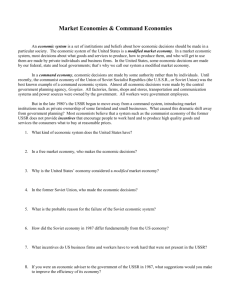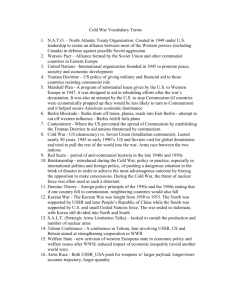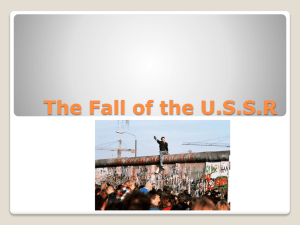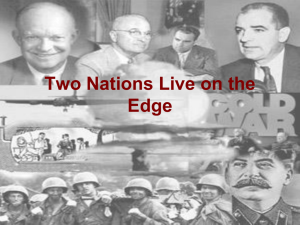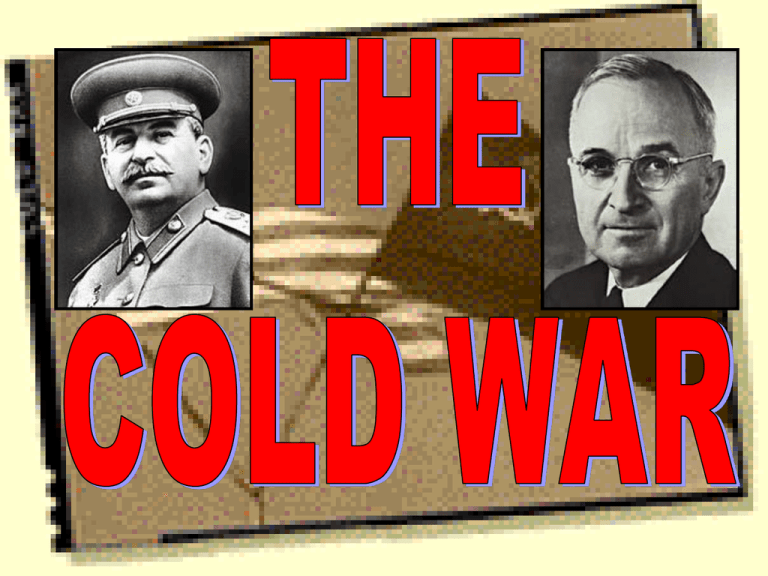
1918?? – US fails to recognize
Bolshevik regime and the USSR
April 12, 1945?? FDR dies – Stalin
had immense respect for FDR which
did not carry through to Truman
1946?? – Kennan Telegram – urging
the US gov’t to recognize the evil’s of
Stalin’s regime
Creating a National Security
State, 1945-1949
• Alliance between Soviet Union and the
United States was not based on
collaboration, but on cooperative defeat
of Axis powers
– America sent troops to help anti-communist
during RR
– Did not recognize Soviet government until
1933
• Relations between the two countries
descended into suspicion and growing
(c) 2003 Wadsworth Group All rights reserved
August 1945?? Atomic Bombs were
dropped on Hiroshima and Nagasaki
1946?? Winston Churchill – coined
the phrase “The Iron Curtain”
What other dates can be included in
this list???
• Before WWII – Europe was the
center of World Politics
•WWII – Europe was destroyed
by the war, leaving power
vacuum which needed to be
filled
Onset of the Cold War
• Interpretations of Cold War’s origins
– Traditional: Soviet expansion and desire to spread
Communism
– Revisionists: U.S. threatened Soviets into the Cold
War
– Rival interests made Cold War inevitable
• Harry S. Truman
• Joseph Stalin
• Potsdam Conference (1945) 1ST MEETING OF
Truman and Stalin
• Soviet sphere of influence in Eastern Europe
• “National security”
(c) 2003 Wadsworth Group All rights reserved
1. TWO BIG SUPER POWERS
•
Giant Chess game of power
•
Chess board was the world
•
Decisions were made for national selfinterest
AMERICAN GOALS – ECONOMICALLY
AND POLITICALLY OPEN WORLD –
PROVIDES MARKETS FOR PRODUCTS
SOVIET GOALS- REBUILD TO PROTECT
ITS OWN INTERESTS
ESTABLISH SATELLITE NATIONS
COUNTRIES SUBJECT TO SOVIET
DOMINATION AND FRIENDLY TO SOVIET
GOALS “COLLECTIVE SECURITY”
3.PSYCHOLOGICAL
• Misperception – no matter what
the Russians did it would be
misperceived and vice versa
• Mirror Imaging – Americans
believe that what we do is right
and good, and look at Soviets
and what they do as bad and evil
(reverse happens in USSR)
THE SUN SETS ON EASTERN
FREEDOM
• POLAND BECOMES COMMUNIST
ELIMINATES ALL OPPOSITION
• ALBANIA (1945) AND BULGARIA(1948)
FORCED INTO COMMUNISM
• CZECHOSLOVAKIA, HUNGARY, ROMANIA
ARE NEXT
• EAST GERMANY FOLLOWS
• FINLAND AND YUGOSLAVIA GAIN A
MEASURE OF FREEDOM FROM THE
SOVIET UNION BUT, ARE STILL
COMMUNIST
The Ideological Struggle
Soviet &
Eastern Bloc
Nations
[“Iron Curtain”]
Communism is not
compatible with
GOAL spread democracy and
capitalism
world-wide
Communism
METHODOLOGIES:
Espionage [KGB vs. CIA]
Arms Race [nuclear escalation]
US & the
Western
Democracies
GOAL
“Containment” of
Communism & the
eventual collapse
of the Communist
world.
[George Kennan]
Ideological Competition for the minds and hearts
of Third World peoples [Communist govt. &
command economy vs. democratic govt. & capitalist
economy] “proxy wars”
Bi-Polarization of Europe [NATO vs. Warsaw Pact]
US PLANS TO CONTAIN
COMMUNISM
• TRUMAN DOCTRINE
• MARSHALL PLAN
• Policy of Containment
• GEORGE KENNAN
• Domino theory
Truman Doctrine [1947]
1. Civil War in Greece.
2. Turkey under pressure from the
USSR for concessions in the
Dardanelles.
3. The U. S. should support free
peoples throughout the world who
were resisting takeovers by armed
minorities or outside pressures…We
must assist free peoples to work out
their own destinies in their own way.
4. The U.S. gave Greece & Turkey
$400 million in aid.
• Initially – filled by US
•Marshall Plan
•Nuclear Power
•Only intact industrialized country
•USSR – begins a rapid recovery –
initiating the Bi-Polar Period
The “Iron Curtain”
From Stettin in the Balkans, to Trieste in the
Adriatic, an iron curtain has descended across the
Continent. Behind that line lies the ancient
capitals of Central and Eastern Europe.
-- Sir Winston Churchill, 1946
Marshall Plan [1948]
1. “European Recovery
Program.”
2. Secretary of State,
George Marshall
3. The U. S. should provide
aid to all European nations
that need it. This move
is not against any country or doctrine,
but against hunger, poverty, desperation,
and chaos.
4. $12.5 billion of US aid to Western
Europe extended to Eastern Europe &
USSR, [but this was rejected].
Containment Policy
• George F. Kennan, Senior State Department
official, posted to USSR during war.
• July 1947, article in Foreign Affairs journal, under
author “X”
– War originally a Long Telegram sent back to State
Department, then published in Foreign Affairs
– “...we are going to continue for a long time to
find the Russians difficult to deal with. It does
not mean that they should be considered as
embarked upon a do-or-die program to
overthrow our society...
CONTAINMENT TO STOP THE
DOMINO’S
• CONTAINMENT THE IDEA OF
LIMITING COMMUNISM TO THE
PLACES IT ALREADY EXISTS
– DEVELOPED BY AMERICAN GEORGE KENNAN
– BELIEVED THAT COMMUNISM WOULD
EVENTUALLY DESTROY ITSELF.
•Soviet Troops block all road,
rail and water traffic between
West Berlin and the West
•US, Britain, and France
airlifted 23 million tons of food
and supplies into the city for 15
months
Berlin Blockade & Airlift (1948-49)
•Mao Tse Tung
•Enormous land mass
now under communist
control
•Korean War 1950-53
Mao’s Revolution: 1949
Who lost China? – A 2nd } Power!
4th French Republic: 1945-1958
1. Democratic, but politically
unstable
[27 governments!]
2. Universal suffrage.
3. Weak President; powerful
legislature
4. Many political parties
[coalition governments]
5. Failure to gracefully leave
Indochina.
6. Botched the Suez War.
7. Failed to settle the Algerian
Crisis.
5th French Republic
(1958-Present)
1. Powerful President.
* first: Charles
DeGaulle
2. Weak Cabinet.
3. Weakened
legislature.
4. Separation of
powers.
Clement Attlee & the Labor Party:
1945-1951
1. Limited socialist program
[modern welfare state].
Natl. Insurance Act
Natl. Health Service
Act
2. Nationalized coal mines,
public utilities, steel
industry, the Bank of
England, RRs, motor
transportation, and aviation.
3. Social insurance legislation: “Cradle-to-Grave”
security.
4. Socialized medicine free national health care.
Clement Attlee & the Labor Party:
1945-1951
6. Britain is in a big debt!
7. The beginning of the end of the
British Empire.
India – 1947
Palestine – 1948
Kenya Mau Mau
uprising - 1955
Churchill Returns: 1951-1955
He never really
tried to destroy the
“welfare state”
established by
Attlee’s government.
The Federated Republic
of Germany
1. Created in 1949 with
the capital at Bonn.
2. Its army limited to
12 divisions [275,000].
3. Konrad Adenauer, a
Christian Democrat,
was its 1st President.
Coalition of moderates and conservatives.
Pro-Western foreign policy.
German “economic miracle.”
4. “Father of Modern Germany.”
The War Begins
• The USSR is ignored and
put down time and again
by the U.S.
• Tensions become greater
as the Soviets get a hold of
atomic secrets.
• The Soviets build their
own atomic bombs and the
cold war begins as the
U.S. retaliates by building
more weapons.
The Arms Race:
A “Missile Gap?”
}
The Soviet Union
exploded its first
A-bomb in 1949.
}
Now there were
two nuclear
superpowers!
•Most visible and most frightening
aspect of the Cold War
•Awesome Power of the weapons
•WWII’s most powerful conventional
bomb – 1,200 Tons of TNT
•Hiroshima – 20,000 tons of TNT
•1 megaton warhead on an ICBM =
1,000,000 tons of TNT
1945 – Hiroshima and Nagasaki – US
display their atomic power
1949 – USSR test first atom bomb
1952 – US tests first Hydrogen bomb
1952 – Britain tests first atom bomb
1960 – France tests first atom bomb
1964 – China test first atom bomb
•Height – Late 1970s Early 1980s
•23,000 large Nuclear Warheads
•50,000 smaller Nuclear charges
•Enough to kill populations of both
the US and the USSR many times over
•MAD – Mutually Assured Destruction
•NATO – North Atlantic
Treaty Organization
•ANZUS – Australia, New
Zealand and US
•SEATO – South East Asia
Treaty Organization
North Atlantic Treaty Organization
(1949)
United States
Luxemburg
Belgium
Netherlands
Britain
Norway
Canada
Portugal
Denmark
1952: Greece &
Turkey
France
Iceland
Italy
1955: West Germany
1983: Spain
Warsaw Pact (1955)
}
U. S. S. R.
}
East Germany
}
Albania
}
Hungary
}
Bulgaria
}
Poland
}
Czechoslovakia
}
Rumania
The Hungarian Uprising: 1956
Imre Nagy, Hungarian
Prime Minister
}
Promised free
elections.
}
This could lead to the
end of communist rule
in Hungary.
Premier Nikita Khrushchev
About the capitalist
states, it doesn't
depend on you
whether we
(Soviet Union) exist.
If you don't like us,
don't accept our
invitations, and don't
De-Stalinization
invite us to come
Program
to see you. Whether
you like it our not, history is on our
side. We will bury you. -- 1956
Sputnik I (1957)
The Russians have beaten America in
space—they have the technological edge!
Nixon-Khrushchev
“Kitchen Debate”
(1959)
Cold War --->
Tensions
<--- Technology
& Affluence
U-2 Spy Incident (1960)
Col. Francis Gary
Powers’ plane was
shot down over Soviet
airspace.
Paris, 1961
Khrushchev & JFK meet to discuss Berlin and
nuclear proliferation. Khrushchev thinks that
JFK is young, inexperienced, and can be rolled.
The Berlin Wall Goes Up (1961)
Checkpoint
Charlie
Ich bin ein Berliner!
(1963)
President Kennedy
tells Berliners
that the West is
with them!
Khruschev Embraces Castro,
1961
Bay of Pigs Debacle (1961)
Cuban Missile Crisis (1962)
1.Khrushchev decided to
deploy nuclear weapons in
Cuba
2.Kennedy said no – told
Soviets to get out
3.Khrushchev backed down
Cuban Missile Crisis (1962)
We went eyeball-to-eyeball with the
Russians, and the other man blinked!
Kennan’s policy to halt Soviet
expansion – a policy of determined
and continued resistance against
Communism.
1.US supported dictators with
horrible human rights records
solely because they were anticommunist
2.Vietnam – Civil War? - A
Misapplication of Containment?
3.Southeast Asia and Middle East –
became the battlegrounds for the
Cold War
4.Aid Programs – created as
weapons to buy influence during
the Cold War
•Khrushchev promised
Nuclear Weapons to
China and reneged
•US Couldn’t believe
the split – thought it
was a game
1963 – Rumania begins to pursue
independence
1964 – Brezhnev succeeds Khrushchev
1968 – Soviets invade Czechoslovakia
to stop reform movement
1980 – Solidarity movement established
in Poland
“Prague Spring” (1968)
Former Czech President,
Alexander Dubček
Communism with a human face!
“Prague Spring” Dashed!
Dissidents/playwrights arrested [like
Vaclav Havel—future president of a free
Czech Republic].
1969 -- SALT
• On November 17, the
1st phase of Strategic
Arms Limitation Talks
began in Helsinki,
Finland.
• The finished
agreement, signed in
Moscow on May 26,
1972, placed limits on
both submarinelaunched and
intercontinental
nuclear missiles.
1972 –
Nixon visits China
• Nixon becomes the first U.S. president to
visit China, meeting with Mao Tse-tung on
February 21.
• The two countries issue a communique
recognizing their "essential differences"
while making it clear that "normalization
of relations" was in all nations' best
interests.
• The rapprochement changes the balance
of power with the Soviets.
1979 - Afghanistan
• December 25, 100,000 Soviet troops
invaded Afghanistan as communist Babrak
Karmal seized control of the government.
• U.S.-backed Muslim guerrilla fighters
waged a costly war against the Soviets for
nearly a decade before Soviet troops
withdraw in 1988.
• Afghanistan—the Soviet “Vietnam”
1980 - Solidarity
• On August 14, Lech Walesa led massive
strikes at the Lenin shipyards in Gdansk,
Poland.
• The strikes soon spread to other cities and
formed the nucleus of the Solidarity
movement.
• The communist government conceded to
worker demands on August 31, and
recognized their right to form unions and
strike.
1983 - Star Wars
• March 23, Reagan outlinrd his Strategic
Defense Initiative, or "Star Wars," a
space-based defensive shield that would
use lasers and other advanced technology
to destroy attacking missiles far above the
Earth's surface.
• Soviets accuse the U.S of violating the
1972 Antiballistic Missile Treaty.
• Soviets forced to spend heavily to match
the program causing near economic
collapse.
1985 - Gorbachev
comes to power
• On March 11, Mikhail Gorbachev came to
power in the Soviet Union.
• Gorbachev ushered in an era of reform.
– perestroika
• Economic reform- restructuring
– glasnost
– means openness, allowed greater free
expression and criticism of Soviet policies
1987 - INF
• On December 8, 1987,
Reagan and Gorbachev
signed the Intermediate
Range Nuclear Forces
Treaty
• It mandated the
removal of more than
2,600 medium-range
nuclear missiles from
Europe, & eliminated
the entire class of
Soviet SS-20 and U.S.
Cruise and Pershing II
missiles.
1989 - Berlin Wall falls
• Gorbachev renounced the Brezhnev
Doctrine, which pledged to use Soviet
force to protect its interests in Eastern
Europe.
• On September 10, Hungary opened its
border with Austria, allowing East Germans
to flee to the West.
• After massive public demonstrations in
East Germany and Eastern Europe, the
Berlin Wall fell on November 9.
Fall of Berlin Wall
•Implosion Theory
•USSR collapsed from within
•Devoid of creativity
•Devoid of Competition
•Devoid of Incentive
•The base it was founded on were
the seeds of its destruction
• Personality Theory – It is people
who made the difference
1. Gorbachev – 1st leader of USSR to
graduate from College
A.Perestroika – reform
B.Glasnost – free
exchange of
information
2. Ronald Reagan –
• won the Cold War
• This would demean
50 years on Containment
3. Gorbechev – unleashed forces he
could not control
4. Yeltsin (former Mayor of Moscow) –
pushed for democratic reforms
1. Strategic Overstretch –Soviet put too
many resources overseas
• No way could they maintain their empire
2. Containment – Constant Pressure
from the West
• Reagan’s - $3Trillion Defense
Budget
• SDI – Strategic Defense Initiative – A
Shield (Force Field) – The system was
going to cost a fortune
1. Superpowers withdrew from their
spheres of influence
• Bosnia
• Balkans
2. Enormous Spread of Democracy
3. Refurbishing culture and
economies of E. European States
4. New Countries have entered the
International arena
• 14 from the break down of the
USSR alone
5. Greater use of the UN
• More peacekeeping operations
than in it’s entire history
6. Nuclear Legacy
• Economy of USSR is struggling
• Security Problems
• USSR Nuclear Technicians are
hiring themselves out
7. New Game of Nuclear Proliferation
1. India and Pakistan

